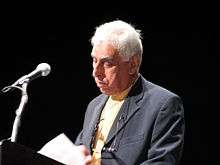Saadi Youssef
Saadi Youssef (Arabic: سعدي يوسف) (born 1934, near Basra, Iraq) is an Iraqi author, poet, journalist, publisher, and political activist.[1] He has published thirty volumes of poetry in addition to seven books of prose.[2]
Saadi Yousef | |
|---|---|
 at PEN World Voices, 2007 | |
| Native name | Arabic: سعدي يوسف |
| Born | 1934 (age 85–86) Abu Al-Khaseeb |
| Language | Arabic |
| Nationality | Iraqi |
| Genre | Poetry |
| Literary movement | Badr Shakir al-Sayyab, Shathel Taqa, Abd al-Wahhab Al-Bayyati |
| Notable awards | Al Owais Prize |
| Website | |
| www | |
Life
Saadi Youssef studied Arabic literature in Baghdad.[1] He was influenced by the free verse of Shathel Taqa and Abd al-Wahhab Al-Bayyati and was also involved in politics from an early age. At that time, his work was heavily influenced by his socialist and pan-Arab sympathies but has since also taken a more introspective, lyrical turn. He has also translated many well-known writers into Arabic, including Oktay Rifat, Melih Cevdet Anday, Garcia Lorca, Yiannis Ritsos, Walt Whitman and Constantine Cavafy. Following his exile from Iraq, Youssef has lived in many countries, including Algeria, Lebanon, France, Greece, Cyprus, and currently he resides in London.[3]
In 2004, the Al Owais Prize for poetry was given to Youssef. In 2007, Youssef participated in the PEN World Voices festival where he was interviewed by the Wild River Review. In 2014, Youssef's poems were forbidden from being included in the Kurdish school curriculum by the Kurdistan Regional Government over a certain poem in which he referred to Kurdistan as "Qardistan," which loosely translates to "Monkey-istan."
English bibliography
Published volumes
- Without an Alphabet, Without a Face: Selected Poems, translated by Khaled Mattawa (Graywolf, 2002). ISBN 1-55597-371-X.[4]
- Nostalgia, My Enemy, translated by Sinan Antoon and Peter Money (Graywolf, 2012). ISBN 978-1-55597-629-3.[5]
In anthology
- Literature from the "Axis of Evil": Writing from Iran, Iraq, North Korea and Other Enemy Nations, edited by Words without Borders (The New Press, 2006). ISBN 978-1-59558-205-8.[6]
- Tablet and Pen, edited by Reza Aslan (Norton, 2010). ISBN 978-0-39306-585-5.[7][8]
- Ghost Fishing: An Eco-Justice Poetry Anthology, edited by Melissa Tuckey (University of Georgia Press, 2018). ISBN 978-0820353159.[9]
Further reading
- Huri, Yair. The Poetry of Sa’di Yûsuf: Between Homeland and Exile. (Sussex, 2006). ISBN 978-1-84519-148-1.
See also
References
- "Saadi Youssef". internationales literaturfestival berlin. 2003. Archived from the original on 14 December 2019. Retrieved 14 December 2019.
- "Iraqi Poetry and Music at Smith". The Poetry Center, Smith College. 7 April 2005. Archived from the original on 14 December 2019. Retrieved 14 December 2019.
- Youssef, Saadi; Mattawa, Khaled (2002). "Introduction". Without an Alphabet, Without a Face. Translated by Mattawa, Khaled. Saint Paul, MN: Graywolf Press. pp. xi-xxiv. ISBN 1-55597-371-X.
- "Without an Alphabet, Without a Face". Graywolf Press. 1 December 2002. Retrieved 12 January 2020.
- "Nostalgia, My Enemy". Graywolf Press. 13 November 2012. Retrieved 12 January 2020.
- "Literature from the "Axis of Evil"". Retrieved 12 January 2020.
- "Tablet and Pen". Words without Borders. Retrieved 12 January 2020.
- "Middle East anthology 'Tablet & Pen' has some real finds". Seattle Times. 8 January 2011. Retrieved 12 January 2020.
- "Ghost Fishing". UGA Press. 1 April 2018. Retrieved 12 January 2020.
External links
- Listen to Saadi Youssef reading his poetry - a British Library recording, 4 March 2009.
- 3 poems at the Wayback Machine (archived 9 December 2007)
- Two poems
- Spiral of Iraqi memory review of Without an Alphabet at Al-Ahram
- Iraqi poet Saadi Youssef on 'bullet censorship' at Socialist Worker